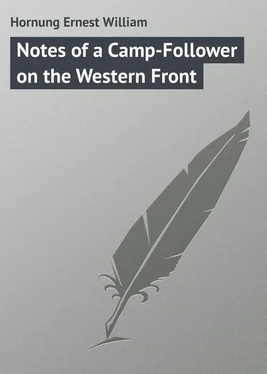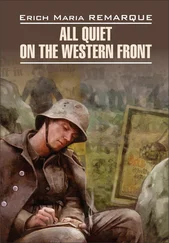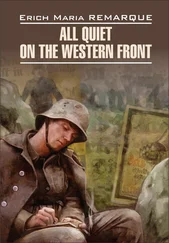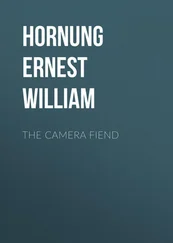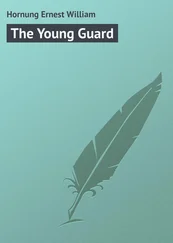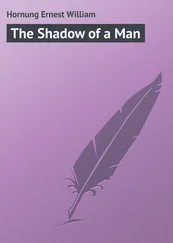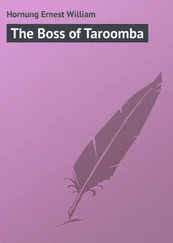Ernest Hornung - Notes of a Camp-Follower on the Western Front
Здесь есть возможность читать онлайн «Ernest Hornung - Notes of a Camp-Follower on the Western Front» — ознакомительный отрывок электронной книги совершенно бесплатно, а после прочтения отрывка купить полную версию. В некоторых случаях можно слушать аудио, скачать через торрент в формате fb2 и присутствует краткое содержание. Жанр: foreign_prose, на английском языке. Описание произведения, (предисловие) а так же отзывы посетителей доступны на портале библиотеки ЛибКат.
- Название:Notes of a Camp-Follower on the Western Front
- Автор:
- Жанр:
- Год:неизвестен
- ISBN:нет данных
- Рейтинг книги:3 / 5. Голосов: 1
-
Избранное:Добавить в избранное
- Отзывы:
-
Ваша оценка:
- 60
- 1
- 2
- 3
- 4
- 5
Notes of a Camp-Follower on the Western Front: краткое содержание, описание и аннотация
Предлагаем к чтению аннотацию, описание, краткое содержание или предисловие (зависит от того, что написал сам автор книги «Notes of a Camp-Follower on the Western Front»). Если вы не нашли необходимую информацию о книге — напишите в комментариях, мы постараемся отыскать её.
Notes of a Camp-Follower on the Western Front — читать онлайн ознакомительный отрывок
Ниже представлен текст книги, разбитый по страницам. Система сохранения места последней прочитанной страницы, позволяет с удобством читать онлайн бесплатно книгу «Notes of a Camp-Follower on the Western Front», без необходимости каждый раз заново искать на чём Вы остановились. Поставьте закладку, и сможете в любой момент перейти на страницу, на которой закончили чтение.
Интервал:
Закладка:
Then, before we went, he took me up to an O.P. on top of all. I think we climbed up to it out of the cul-de-sac , and I know I cowered behind a chunk of parapet; but what I remember best is the zig-zag labyrinth in the foreground, that unending open grave with upturned earth complete, yet quiet as any that ever was filled in; and then the wide sweep of moonlit snow, enemy country nearly all, but at the moment still and peaceful as an arctic floe. Our own trenches the only solid signs of war, like the properties in front of a panorama; not a shot or a sound to give the rest more substance than a painted back-cloth. It was one of those dead pauses that occur on all but the noisiest nights, and make the whole war nowhere more unreal than on the battle-field.
But when the very next day was at its quietest we had just the opposite experience. We were sitting at luncheon in this friendly mess, and the guns might have been a thousand miles away until they struck up all at once, like a musical-box in the middle of a tune. Their guns, this time; but you would not have thought it from the faces round the table. One or two exchanged glances; a lifted eyebrow was answered by a smile; but the conversation went on just the same until the officer nearest the door withdrew detachedly. New subject no longer avoidable, but treated with becoming levity. Not a bombardment, just a Strafe, we gathered; it might have been with blank shell, had we not heard them bursting. Exit another officer; enter man from below. Something like telegram in his hand: retaliation requested by front line. 'Put it through to Brigade.' Further retirements from board; less noise for moment. New sound: enemy 'plane over us, seeing what they've done. New row next door: our machine-guns on enemy 'plane! New note in distance: retaliation to esteemed order… Other man and I alone at table, dying to go out and see fun, but obviously not our place. And then in a minute it is all over, not quite as quickly as it began, but getting on that way. Strafe stopped: 'plane buzzing away again: machine-guns giving it up as a bad job: cheery return of Belisarii, in the order of their going, Colonel last and cheeriest of all.
'Had my hair parted by a whizz-bang,' says he, 'up in that O.P. we were in last night.'
And, as he replenished a modest cup, the curtain might have fallen on the only line I remember in the whole impromptu piece, which could not have played quicker as a music-hall sketch, or held a packed audience more entranced than the two civilian supers who had the luck to be on the stage.
But we had to pay for our entertainment; for although it turned out to have been an absolutely bloodless Strafe, yet a portion of our parapet had been blown in, which made it inexpedient for us to go round the front line that afternoon, as previously arranged by our indulgent hosts. In the evening they were going into reserve, and another famous Regiment coming to 'take over.' The new-comers, however, were just as good to us in their turn; and the new Colonel so kind as to take me round himself on Christmas morning.
CHRISTMAS DAY
The tiny hut is an abode of darkness made visible by a single candle, mounted in its own grease in the worst available position for giving light, lest the opening of the door cast the faintest beam into the sunken road outside. On the shelf flush with the door glimmer parental urns with a large family of condensed-milk tins, opened and unopened, full and empty; packing-cases in similar stages litter the duck-board flooring, or pile it wall-high in the background; trench-coats, gas-masks, haversacks and helmets hang from nails or repose on a ledge of the inner wall, which is sunken roadside naked and unashamed. Two weary figures cower over the boiler fire; they are the other man and yet another who has come up for the night. A third person, who may look more like me than I feel like him, hovers behind them, smoking and peering at his watch. It is the last few minutes of Christmas Eve, and for a long hour there has been little or nothing doing. Earlier in the evening, from seven or so onwards, there seemed no end to the queue of armed men, calling for their mug of cocoa and their packet of biscuits, either singly, each for himself, or with dixies and sand-bags to be filled for comrades on duty in the trenches.
The quiet has been broken only by the sibilant song of the boiler, by desultory conversation and bursts of gunfire as spasmodic and inconsequent. Often a machine-gun has beaten a brief but furious tattoo on the doors of darkness; but now come clogged and ponderous footfalls – mud to mud on the duck-boards leading from the communication trench – and a chit is handed in from the outer moonlight.
'24 – 12 – 17. 'To Y.M.C.A. Canteen, ' – Avenue.'Dear Sirs, – I will be much obliged if you will supply the bearer with hot cocoa (sufficient for 90 men) which I understand you are good enough to issue to units in this line. The party are taking 2 hot-food containers for the purpose.
'Thanking you in anticipation, 'I am, yours faithfully, '(Illegible), 'O/C B Co., '1/8 (Undesirable).'Torpid trio are busy men once more. Not enough cocoa ready-made for ninety; fresh brew under way in fewer seconds than it takes to state the fact. Third person already anchored beside open packing-case, enormous sand-bag gaping between his knees, little sealed packets flying through his hands from box to bag in twins and triplets. By now it is Christmas morning; cakes and cigarettes are forthwith added to statutory biscuits, and a sack is what is wanted. Third person makes shift with second sand-bag, which having filled, he leaves his colleagues working like benevolent fiends in the steam of fragrant cauldrons, and joins the group outside among the shell-holes.
They are consuming interim dividends of the nightly fare, as they stand about in steely silhouette against the shrouded moonlight. The scene is not quite so picturesque as it was last night, when no star of heaven could live in the light of the frosty moon and every helmet was a shining halo; to-night the only twinkle to be seen is under a helmet's rim.
'Merry Christmas, sir, an' many of 'em,' says a Tyneside voice, getting in the first shot of a severe bombardment. The third person retaliates with appropriate spirit; the interchange could not have been franker or heartier in the days of actual peace on earth and apparent good-will among men. But here they both are for a little space this Christmas morning. Cannon may drum it in with thunderous irony, and some corner-man behind a machine-gun oblige with what sounds exactly like a solo on the bones, but here in the midst of those familiar alarms the Spirit of Christmas is abroad on the battle-field. He may be frightened away – or become a casualty – at any moment. One lucky flourish with the bones, one more addition to these sharp-edged shell-holes, and how many of the party would have a groan left in him? One of them groans in spirit as he thinks, never so vividly, of countless groups as full of gay vitality as this one, blown out of existence in a blinding flash. But his hardy friends are above such morbid imaginings; the cold appears to be their only trouble, and of it they make light enough as they stamp their feet. Some are sea-booted in sand-bags, and what with their jerkins and low, round helmets, look more like a watch in oilskins and sou'-westers than a party of Infantry.
'We nevaw died o' wintaw yet,' says the Tynesider. 'It takes a lot to kill an old soljaw.' But he owns he was a shipyard hand before the war; and not one of them was in the Army.
All hope it is the last Christmas of the war, but the Tyneside prognostication of 'anothaw ten yeaws' is received with perfect equanimity. There is general agreement, too, when the same oracle dismisses the latest peace offer as 'blooff.' But it must be confessed that articulate ardour is slightly damped until somebody starts a subject a great deal nearer home.
Читать дальшеИнтервал:
Закладка:
Похожие книги на «Notes of a Camp-Follower on the Western Front»
Представляем Вашему вниманию похожие книги на «Notes of a Camp-Follower on the Western Front» списком для выбора. Мы отобрали схожую по названию и смыслу литературу в надежде предоставить читателям больше вариантов отыскать новые, интересные, ещё непрочитанные произведения.
Обсуждение, отзывы о книге «Notes of a Camp-Follower on the Western Front» и просто собственные мнения читателей. Оставьте ваши комментарии, напишите, что Вы думаете о произведении, его смысле или главных героях. Укажите что конкретно понравилось, а что нет, и почему Вы так считаете.
